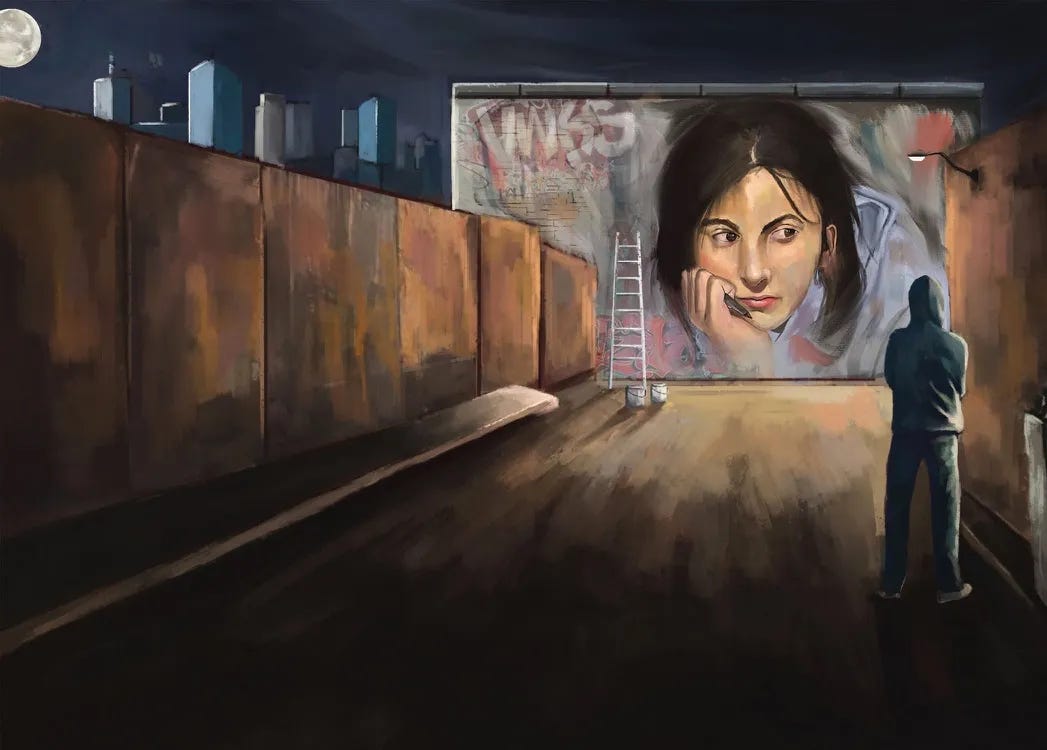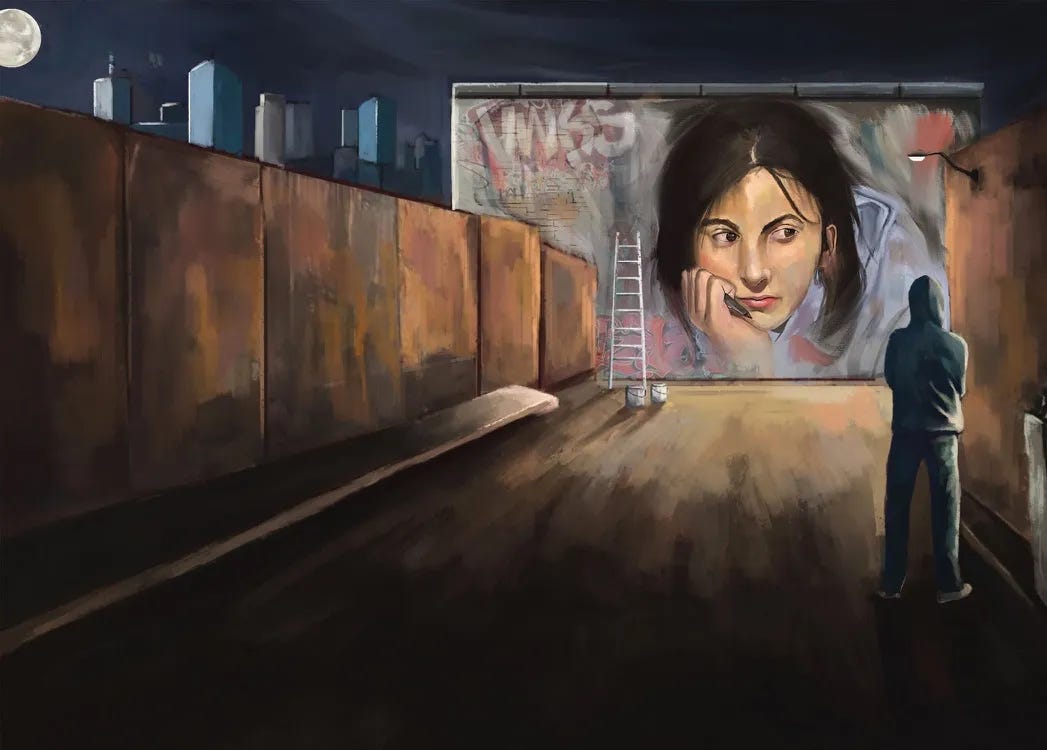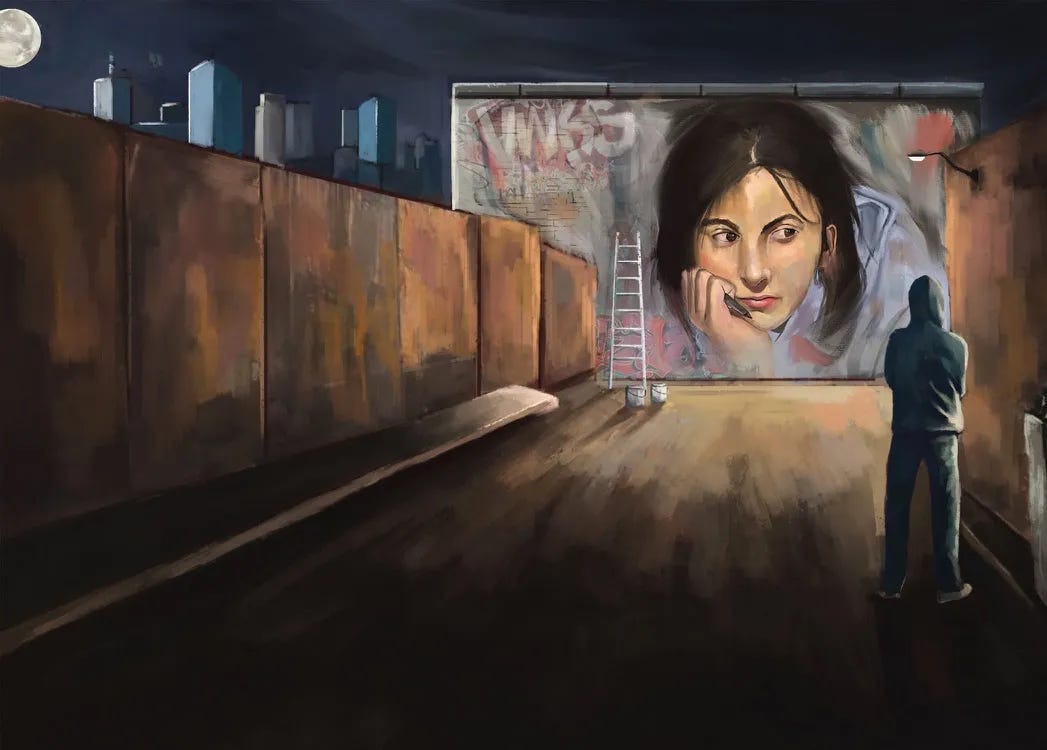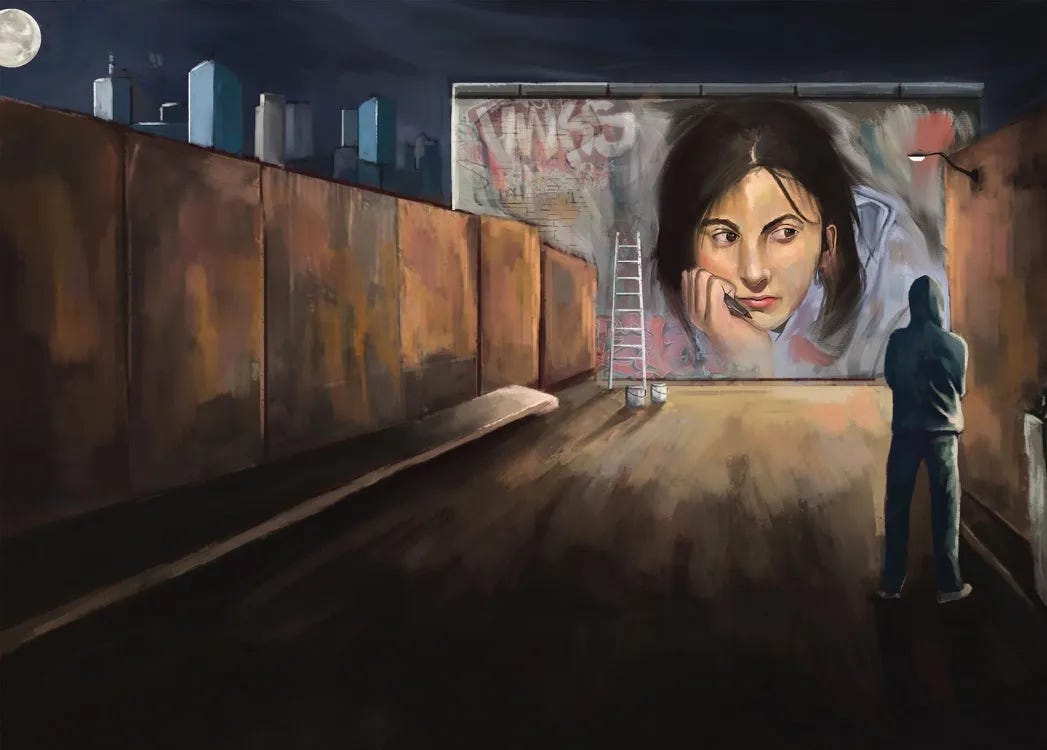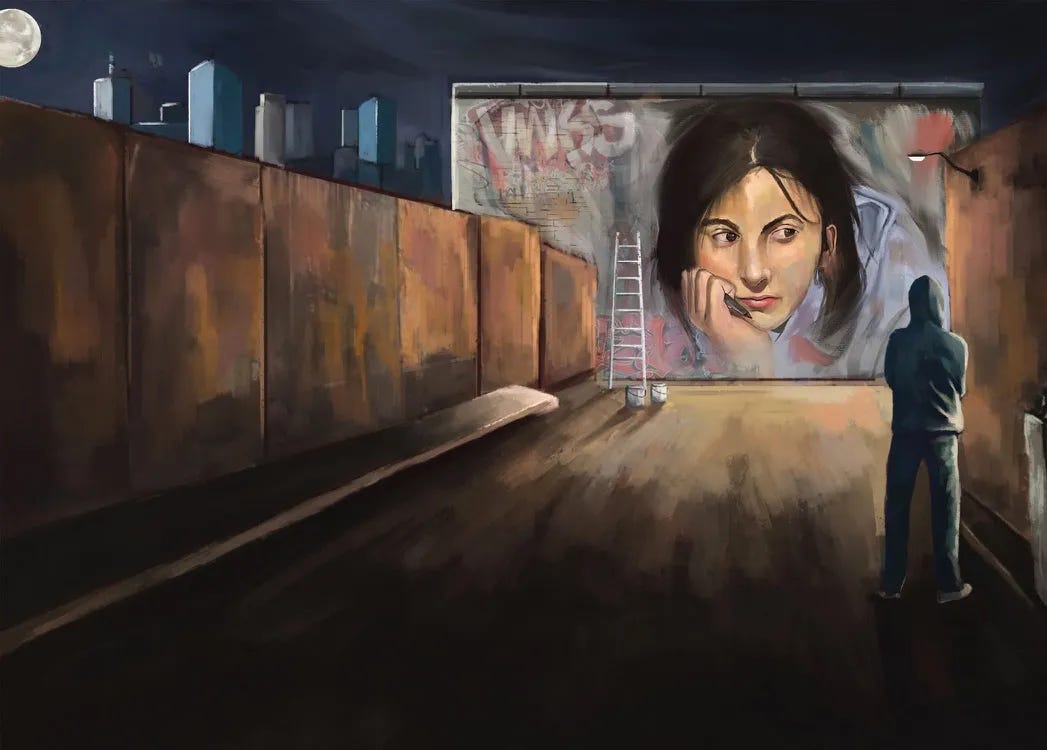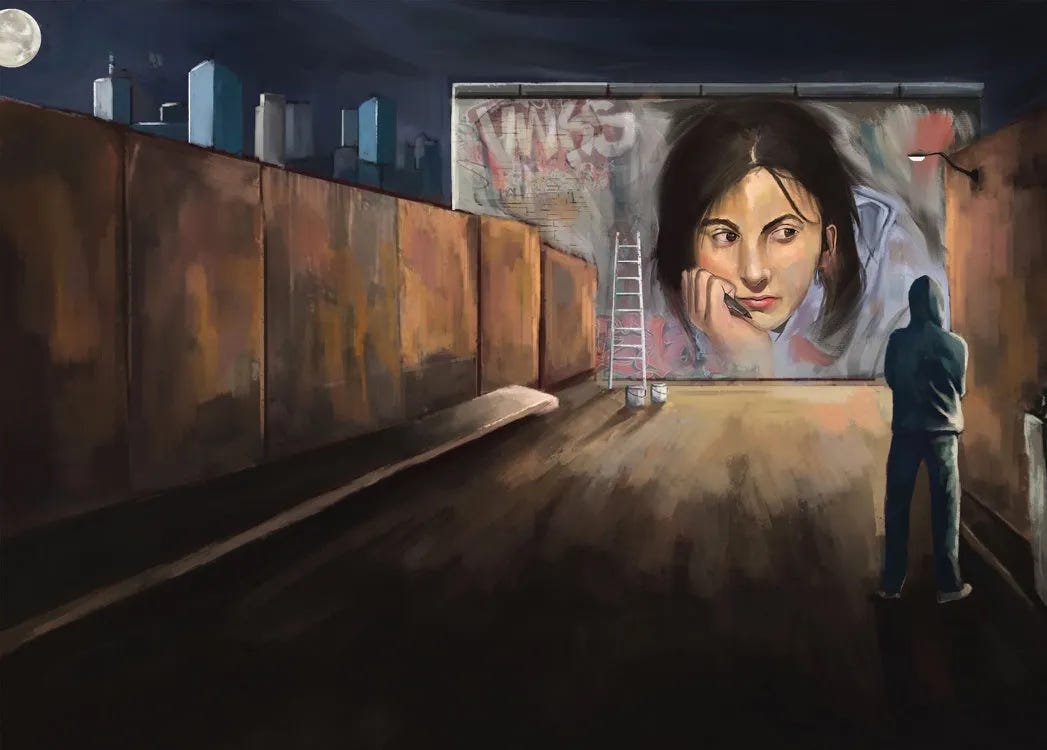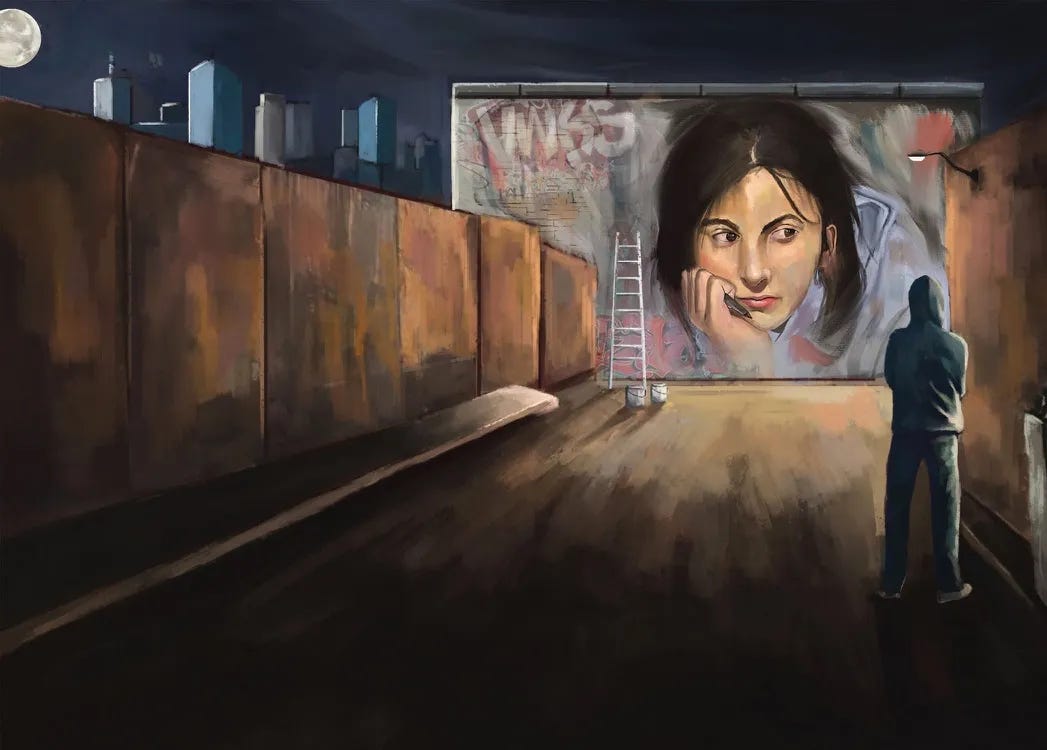
On the third morning in the cave, Zeph began to pace.
Harriet watched as he trod the perimeter of the cave, stopping occasionally to peer upwards towards the light streaming through the three gaps or running his hand along the smooth rock walls in an attempt to find a way they might be scaled and their escape made through a gap above. Then, that hope abandoned, Zeph began to pace from the boulder-blocked cave entrance to the well, pacing, pacing back and forth, lost in thought, occasionally stopping either to peer through the tiny crack of light at the edges of the boulder, or to look again down into the blackness of the well.
Then, suddenly, he stopped pacing. He was now again at the well, and Harriet could see that he was rummaging around with the contents of his backpack.
‘Harriet, come here,’ he called. She touched Stilwell lightly on the shoulder as she passed him on her way to the back of the cave. Stilwell had sat silent and dejected all morning.
‘That underground stream must go somewhere,’ Zeph said.
‘Zeph, it’s not a way out.’
‘It might be. There’s no other possible escape.’
Harriet now noticed that Zeph had coils of rope draped over one arm.
‘Where did you get that?’ she asked.
‘Some of it from the town. Some of it from Stilwell, the ropes that bound him. I’ve joined them together. I need your help here.’
‘You want me to lower you down the well?’ Harriet felt a sudden faint hope.
‘Yes. If I jerk on the rope, you’re to pull me up. The spring down there could be a way out.’
Could it? Was this a good plan?
‘You’ll be too heavy. I won’t be able to pull you up. And maybe you’ll get stuck down there.’
‘Stilwell can help if necessary. I won’t get stuck. I’ll be careful. It’s our only hope Harriet. I’ve got to try it. Or at least see what it’s like down there.’
This was true. It was their only hope. She wanted to believe it could work. But the chamber was narrow. She couldn’t imagine Zeph fitting. And it was pitch black. Harriet recoiled at the thought of crawling around blind in a confined space.
‘Just look, OK Zeph?’ she said. ‘Just at the bottom. Don’t try crawling through the water at the bottom. Just see what’s there and we can talk about it when you come back up.’
Zeph nodded, then bent to tie the rope around his ankles. ‘I’ll go head first,’ he said. ‘I think that’s best.’ Then he hoisted himself up onto the well lip.
‘If I jerk on the rope, just pull me up.’
‘Please be careful.’
‘I will.’
‘Don’t take any risks. If it’s too narrow, don’t push forward. Don’t get stuck. Please Zeph. Promise you won’t go further than is safe.’
‘I won’t. I’ll be careful.’
He bent forward, head into the well, then slowly began to lower himself. Very slowly, just a few centimetres every ten seconds or so, until Harriet could no longer see him. She felt helpless. She willed him to tug on the rope, for this waiting to be over.
And then the rope stopped moving.
‘Zeph,’ she called. ‘Are you OK?’
There was a muffled sound from down below. His body was almost certainly filling most of the cavity, smothering any possibility of clear communication. He didn’t sound alarmed. But then there were a number of awful reasons why that might be. The rope sagged loosely in her hands.
Then, suddenly, there was a tug and Harriet quickly took up the slack and started pulling. The rope went taut. But she could not reel in the dead weight, either because she was not strong enough or because Zeph was stuck.
‘Stilwell,’ she called. ‘Quick. Come here!’
As Stilwell hurried towards her, Harriet heard again a muffled sound from below. She started to panic. She imagined Zeph gasping for air.
Stilwell joined her at the rope.
‘Pull,’ Harriet gasped. ‘Pull as hard as you can. 1–2–3 pull. 1–2–3 pull.’ Her attempts to co-ordinate their labour were useless, as in her panicked state she found herself jerking on the rope before the count of 3.
Stilwell put a foot on the lip of the well, then pushed up with all his strength. And the rope moved. He took up the slack and again pushed up, with two legs this time, and again there was movement. Zeph, it seemed, had passed through the narrowest part. Harriet watched as Stilwell now pulled with less effort. And then she heard Zeph’s grunts and at last saw his feet.
They helped him out, and for a while Zeph sat on the cave floor, sucking in great gulps of air.
‘It’s no good,’ he said at last. ‘I got to the bottom. I touched the water.’ He paused and took some more deep breaths. ‘I felt around the bend, into the underground stream. I went a little way along. But it got too narrow. There’s no way through.’
The three sat brooding around the fire.
‘Are you sure we couldn’t shift the boulder,’ Harriet asked.
It was the second time she’d asked it in the last hour. ‘It took more than twenty men to shift the rock, there’s no way we could move it,’ Zeph had said the first time. This time he didn’t respond.
‘What’s that?’ asked Stilwell, noticing the glistening gold on Zeph’s thumb and finger.
‘I touched some water in a stream. It won’t come off.’
Stilwell took Zeph’s hand in his own and brushed his fingers across the gold.
‘It’s beautiful.’
Zeph looked at his hand as if studying it properly for the first time. Harriet too. It looked different in this light. Or perhaps they’d not studied it so closely before. It gleamed, like metal, and yet the skin felt soft to touch. In different circumstances, Harriet thought to herself, she’d be awed. In here, it was more a distraction from the sense of an inevitable and slow death by starvation. She’d read macabre stories of humans cut off from food supplies. Escaped convicts in Tasmania. An aircrash in the Andes. She shuddered, then forced her mind away from these grisly thoughts and back to Zeph’s golden fingers.
‘It’s really beautiful, your hand, Zeph,’ she said. ‘I hadn’t really noticed it before, like when we were outside and it was all bright. I’ve just noticed it now, how beautiful it is, and …’
‘Shoosh,’ said Zeph. For a split second Harriet assumed he’d had enough of her prattling, irritating voice. But then she could see that he’d heard something.
The three listened.
Between the crackles of the fire, they could hear what sounded at first like a straw broom being dragged across the floor of the cave.
Then they saw it.
A large snake was crawling from under a low ledge a few metres to their right. It was about a metre long, light green, tongue testing the air and its eyes shining in the light of the fire. It seemed entirely unaware or unconcerned by their presence, and was gliding towards the bier on which the dead princess lay.
At first the three sat stunned. But then there was a sudden lunge from Harriet’s right. It was Stilwell. He had grabbed Zeph’s hatchet, and almost before Harriet had time to shout out in fright, the snake lay dead, hacked into four pieces by three clean blows of the hatchet. Stilwell, still in the grip of the frenzy, then threw the hatchet to the ground and stood between the dismembered snake and the princess. Then, as if slowly shaking himself free from a spell, he began to breathe more slowly.
‘Stilwell.’ It was Zeph’s voice. ‘Stilwell. I want you to listen to me. Listen to my voice. I want you to just listen to my voice, and to do exactly, exactly, what I tell you. Can you hear me Stilwell?’
Harriet could see Stilwell nod. ‘Yes,’ he said, his throat dry and his voice weak. ‘I can hear you.’
‘What I’m about to say is very important. Our survival might depend on it. Do you understand Stilwell?’
Again he nodded.
‘There is a second snake. No Stilwell! You mustn’t move! Do not move! Stand absolutely still.’
Harriet slowly turned her head towards the ledge. She could see it now, this snake a ghostly white, almost translucent, as if lit up from inside by a faint glow. It was uncurling itself from the ledge.
‘We must not harm this snake Stilwell. Are you hearing me? You must not move. Just watch.’
The white snake began to slither across the cave floor, moving effortlessly towards its hacked mate, seemingly unconcerned that there were other living beings in the cave. Stilwell, wide-eyed, watched as well.
They watched a most extraordinary drama unfold.
The white snake, tongue flicking and eyes glowing, visited in turn each of the four grizzly parts, hardly pausing at each. Then it carefully nudged the four pieces together, wound to wound, so that the corpse lay stretched in a single line. The white snake then took a turn around the corpse, as if assessing its work, making tiny adjustments to bring the severed parts into closer alignment. Apparently satisfied, it returned to the ledge.
Zeph held up a hand. Wait, he seemed to be signalling, there’s more to come.
And indeed there was. The snake re-emerged, this time holding in its mouth three sprigs, each with a dozen or more tiny green spikes. Harriet thought they looked like the rosemary sprigs that her grandfather put on potatoes when he was roasting them.
It carefully placed the sprigs on the corpse, one sprig on each wound.
And then the green snake stirred.
At first it was just the faintest of shudders, then a tiny jerk, and finally it raised its green head, shook off the sprigs, and then followed its white partner and disappeared behind the ledge.
The three were still for some time, Stilwell by the bier and Harriet and Zeph by the fire.
‘How did you know?’ said Harriet at last.
‘I don’t know,’ said Zeph. ‘I just knew.’
‘You knew what was going to happen?’
‘No. I had no idea what was going to happen. I just knew … well, I just knew that we had to wait.’
Zeph then bent down near where the green snake had lain. There were still smears of blood on the cave floor and on the hatchet which lay nearby. The three green sprigs lay where the snake had shrugged them off. Zeph picked them up.
‘I’ve seen these before,’ he said. ‘I’ve seen this bush.’
‘It’s rosemary, isn’t it,’ said Harriet.
He smelt the spikes leaves. ‘No. Not rosemary. It doesn’t smell like rosemary. But it’s familiar. I’ve seen it before.’
Harriet sensed Stilwell at her side. At first he seemed just to be listening. Then he reached over and gently took the three spikes from Zeph’s hand. He turned and approached the bier.
What happened next seemed to unfold in slow motion.
A golden light, squeezing through the three gaps in the cave roof, illuminated the dead princess and the young man now standing by her head. Above the body there hovered tiny wisps of smoke and little clouds of dust motes from the fire.
Stilwell lent forward. He carefully took the golden coins, one from her right eye and then one from her left.
He kissed the princess gently on the forehead and then on her cold lips.
Then he took the first sprig and placed it on the princess’s right eye.
He took the second sprig and placed it on the princess’s left eye.
He took the third sprig and placed it on the princess’s mouth.
Then he stepped back. Harriet held her breath. She felt Zeph’s body tense beside her.
At first it seemed as though what worked with the snakes had no power to work with the princess. But then the sprig on the princess’s mouth shivered. Then again. Then the princess opened her eyes. Stilwell reached over and brushed the three sprigs gently from her face. She didn’t look at him. Or around. She just lay still, breathing steadily now and looking calmly up at the light above, as if she’d just gently awoken from a deep sleep.
Neither Harriet nor Zeph moved.
Stilwell, too, was still and the cave silent, but for the occasional drip from above which pattered onto the dusty cave floor.
Then the princess spoke.
‘God in heaven, where am I?’
‘You are with me, my dear wife,’ said Stilwell.
‘I am thirsty,’ she said.
The spell broken, Stilwell looked over at Harriet and Zeph, then gestured silently for one of them to bring some water. Harriet sensed some mysterious shift in the social order, Stilwell now the mouthpiece of someone who gives orders.
There was a bowl by Harriet’s feet that had recently been filled from the well, and she picked it up and approached the bier. She was about to show it to the princess, who was now sitting up, her hands folded serenely in her lap, her legs still stretched out as they’d been as she lay on the bier. But Stilwell stepped in front of Harriet and took the bowl. He put it to the princess’s lips and she drank.
Harriet stared at the princess, who seemed unconcerned or unaware about having been woken from the dead. She looked down at Harriet, then over at Zeph, then with a raised eyebrow at Stilwell.
‘They are strangers from another land,’ he said. ‘They’re captives with us here in this cave.’
The princess looked slowly around. She looked over at the cave entrance.
‘I was entombed here with you, as was agreed when we married,’ said Stilwell.
Still the princess seemed undisturbed.
‘The entrance. Can it be unblocked?’
‘It cannot.’
‘You will then find another way. I do not wish to stay here much longer.’
And then, though Harriet was finding it difficult to believe what she was seeing, the princess lay back on the bier, closed her eyes, and seemed to slip into a deep sleep. Her breathing was unhurried and soft. It was if she were waiting for the inevitable restoration of the world as she would will it.
Stilwell was a man transformed. Where before he had been all despondency and passivity, now he was all impatient agitation.
He hurried to the fire, and began to throw wood onto it. Sparks flew up, the cave walls danced in the light of the growing flames. He opened a second bottle of wine and carefully poured a measure into a bowl, ready for the princess when she awoke, then took a quick desperate swig himself. He checked the cave entrance, giving the boulder a couple of futile slaps. Then he beckoned for Zeph and Harriet to follow him to the well.
‘You heard what she said,’ he began, looked neither in the eye but instead picking up the rope that Zeph had left lying by the side of the rock. ‘We must get out, and soon. She will not ask a second time.’
Harriet couldn’t believe her ears.
‘This is the only way, clearly,’ he said, throwing the rope so that it landed at Zeph’s feet. ‘You must go down again. And this time, you must find a way out.’
‘Don’t be stupid Stilwell.’ Harriet was now feeling irritated, both with Stilwell and with this insufferable princess who seemed to imagine that her wishes were unstoppable forces of nature. ‘There’s no way out there. Zeph has already told you that. It’s too narrow.’
‘You have no choice,’ said Stilwell, keeping his eyes on Zeph and acting as if Harriet had said nothing. ‘You must go.’
Zeph shrugged his shoulders. ‘I’ve tried and I do not fit. You go.’
‘But I am bigger than you,’ said Stilwell. ‘It must be you.’
In an awful instant, Harriet knew exactly what must come next. Indeed, the thought that perhaps she was the one who should go down the well had occurred to her earlier, as she was pulling on the rope in an attempt to bring Zeph to the surface. She was both thinner and shorter than Zeph. But she was also less brave. As she’d been pulling on the rope, willing him to come to the surface and feeling despairingly guilty about her lack of courage, she’d made a secret promise to the universe that if Zeph came up alive, she would volunteer to go down herself. But when he came up, and as she listened to him describe the terror he’d felt when he thought himself stuck in the narrow chamber, and when she’d seen the look of horror on his face, she’d suppressed the vow. She’d remained silent.
Zeph was now walking away, leaving Stilwell looking both furious and impotent.
Harriet peered into the well’s dark depths. She could hear the splash of water below, but could see nothing.
Better to die slowly in the company of others than to suffocate alone down there, she thought. And anyway, who was to say that the stream below led to the outside? Perhaps it fed some underground reservoir or lake.
She stood upright, and took a step away from the well.
‘Zeph,’ she heard herself call. ‘I’ll go.’
Zeph turned and walked back to the well, pushing Stilwell roughly as he passed.
‘No you won’t,’ said Zeph.
But Harriet could see on his face that it was a possibility that he, too, had entertained.
She picked up the rope.
‘Tie my legs,’ she said to Zeph.
‘Harriet,’ he said, ‘don’t be silly. It’s not good down there. It’s … well, not good. We’ll find another way. They may come back. We’ll make a din. Someone will hear us.’
‘They’re not coming back,’ she said. ‘This is the only way.’
‘Not yet,’ said Zeph. ‘We’ve still got some bread. Tomorrow maybe. But not yet.’
‘I won’t change my mind,’ said Harriet, though she wasn’t as sure as she hoped she sounded. ‘Tomorrow, at first light. I’ll go then.’
It was a grim night. The princess didn’t stir, Stilwell fussed around nonetheless, Zeph seemed to be sleeping though fitfully, but Harriet lay awake, trying to keep her mind occupied. She thought about home, and about waking up in the mornings to the smell of toast and coffee. She thought back to happier times as a little girl when her parents were still alive, and of summer trips to the beach. She thought about Molly McInness and how much she had been enjoying the sense that she was becoming some kind of a writer.
And she thought about Zeph. What a transformation had taken place in him, from the awkward, hunched and retiring teenager. She looked over to where he lay sleeping beside her. He seemed so much older now. And he’d … well, he’d expanded. He seemed taller, weightier. There was the shadow of a beard.
At that moment Zeph opened his eyes. When he saw her looking at him, he tried to smile, but the smile was unconvincing.
‘Can’t sleep?’ he said.
‘Not really,’ said Harriet. ‘Just thinking.’
‘About what?’
‘Oh, lots of things. Good things mainly. About home and stuff.’
She looked over at Stilwell, but he had finally fallen into a deep sleep. Nor was there any movement from the bier.
‘Zeph?’
‘Mmm.’
‘Do you think she’s the one?’
‘The twice-dead one? Maybe. The thought did occur to me.’
‘She’d have to die a second time though. She’s only been dead once.’
‘She’s a pain in the arse,’ said Zeph.
‘A right royal pain in the arse,’ said Harriet. They both smiled.
‘So she’d have to die again before she could be the one?’ said Zeph slowly.
‘Or maybe she will die again soon?’
‘Or maybe she’s not the one,’ said Zeph.
‘Too many maybes.’
‘Maybe,’ said Zeph and they smiled again. Harriet liked his quiet sense of humour. Had it always been there, she wondered. Or was this also something new?
‘Harriet, don’t go down the well.’
‘I think I have to,’ she said.
‘It’s too narrow. Even for you. And even if you get beyond the bend there are sure to be narrow parts. We couldn’t pull you back. The rope wouldn’t reach that far anyway.’
‘I think I have to,’ Harriet repeated.
She must have slept for a while, or at least dozed. For there was light coming from the ceiling shafts when a loud shout jerked her back into consciousness.
‘Snakes!’ It was Stilwell’s voice. ‘The snakes.’
Harriet scrambled to her feet. Zeph too.
‘Where?’ she shouted. She could see no movement in the faint morning light. She was surprised to see that Stilwell was still lying by the smouldering fire.
‘The snakes,’ he said again. ‘They must have come from somewhere.’
‘What are you talking about Stilwell,’ said Zeph. ‘Where are the snakes?’
‘Those snakes,’ said Stilwell. ‘They must have come from somewhere. Maybe that’s also a way out for us.’
He stood up and walked over to the ledge from which the snakes had appeared. It was a small jutting ledge at about ankle height.
Zeph was the first to look. He took one of the candles, lit it from the fire, then lay on his back peering up at the underside of the ledge.
‘There is something here,’ he said slowly. ‘A hole. Maybe big enough for Harriet to squeeze through. Have a look. See what you think.’
Harriet knelt down and peered into the gap. It was big enough, just.
‘What do you think?’ said Zeph.
‘You must go,’ said a cold voice at their backs. It was the princess.
‘What do you think Harriet?’ said Zeph again pointedly.
Harriet took the candle and held it towards the gap. She half expected to see a snake’s beady eyes, but the small tunnel was empty. She couldn’t tell whether it ended in a small chamber out of sight, or whether it extended further out, perhaps to the outside.
‘I could have a look, I suppose,’ she said. ‘I’m a bit worried about the snakes though. They might still be in there.’
‘We could smoke them out,’ said Zeph.
Zeph built a small fire under the ledge, and for a while they watched as the smoke curled up and into the hidden tunnel. Zeph held his hatchet. The princess returned to her bier and sat there with arms folded and a disdainful, faintly impatient, look on her face.
But no snakes appeared. And the smoke kept disappearing into the tunnel, as if either it continued for a long time or had some outlet to the outside world.
‘So what do you think Harriet?’
Harriet had been thinking lots of things. The snakes were so pale: one white, the other a pale green. She was sure they hadn’t seen the light of day. That suggested to her that the tunnel ended somewhere beneath the surface. She’d been thinking about water, as well, and about death. If she was to die in a tunnel, she’d rather it was with water so that, if necessary, she could drown herself. And there’d been another thought, connected with water. It flowed. It was heading somewhere. Though perhaps not logical, the fact that there was a sense of direction in the well that was less clear in the tunnel inclined her to risk what before had seemed the worst of all possible fates. How interesting, she thought, that the well should now appear to have some welcome advantages. It didn’t seem so terrifying.
She explained her thinking to Zeph. She would go down the well.
The sooner the better.
Things suddenly moved swiftly. She was by the well, with Zeph tying the rope to an ankle. They were making last minute contingency plans. She unpinned the ruby brooch and gave it to Zeph. She was hugging him. She was entering the well, head first.
Was this, she wondered, how soldiers felt going into battle against impossible odds? A kind of resignation? A surrender to fate? Perhaps. Harriet was surprised, at any rate, to discover that her heart did not pound as she felt her way into the dark, head first and arms pushing against the walls of the well to keep her descent slow and steady. One step at a time, she kept saying to herself. She wedged her arms against the sides, pressing hard against the rock walls to keep herself from sliding down. Her fingers were stretched wide open, like a frog’s. The rope was attached to her right ankle; Zeph had told her how having both legs bound had restricted his movement. Her feet were bare.
She could hear the water below more clearly now. It made a comforting trickling bubbly sound. She tried to imagine that this was a creek on the outside, that she could hear kids playing and birds calling. Imagining was going to matter in the next little while. So was talking to herself.
She wanted to call out, to tell Zeph that she was fine so far, but she knew from Zeph’s descent that her voice would be muffled. So she saved her breath. And continued the slow awkward descent.
She could see nothing, though she could feel the rope tighten. Zeph was helping to keep her steady. She reached out a hand, as it seemed that she must be close to the water by now. But nothing yet. She hoped the rope was long enough for her to reach the bottom. She felt Zeph’s presence at the other end of the rope.
They’d agreed on a set of signals. One jerk with her foot would be the sign to let out more rope, that she was ready to go further. Two jerks would mean she was ready to go off on her own; Zeph was to let go of the rope. Three jerks would only be used if her nerve failed and she needed to be pulled back up. Or if she thought she was stuck.
She jerked once with her foot, and felt rope slacken. She wished they’d agreed on other signals, so that he could encourage her, or so that she could tell him she wasn’t afraid. Soon, if all went well, she’d have to give the two jerk signal for him to let go. Soon, all going well, she’d be on her own.
And now she could feel a fresh coolness coming off the surface of the water. She felt some tiny splashed droplet on her face. Wedging herself carefully with her legs and one arm, she stretched down with her free hand. Her fingers touched water. Then the rock bed. The stream, it seemed, was no more than about 10 centimetres deep. That was good. She would be able to keep her mouth above the water once she’d entered the tunnel. As long as it was a big tunnel. Big enough for her body at least. And for there to be air to breathe above the surface. But so far, so good.
She gave the rope a single jerk. The rope again slackened. She lowered herself into the water.
The water was flowing away to her left, and flowing quite quickly. This seemed a good sign, though she wasn’t sure why. Maybe it was an illusion; fast flowing water meant a quicker exit. It wasn’t logical. But it was a good thought.
But was there air in the tunnel, or just the fast flowing stream? Harriet felt around in the dark. The tunnel itself was surprising capacious. Not room to crawl, but room enough to wriggle forward on her belly. And plenty of air. Fresh air. Surely this would lead to the outside.
She positioned herself so she’d go head first along the tunnel, balancing on her elbows and knees. She tugged on the rope three times. She felt its coils drop down on top of her head.
Adrift now, unattached. Alone suddenly.
Harriet shifted her weight onto her elbows, drew her knees up as close to her chest as she could, and then slid slowly into the tunnel.
In the watery blackness of the tunnel, Harriet realised she’d made a possibly fatal mistake. She’d forgotten about the narrow bit where Zeph had got stuck, and now there was no lifeline to pull her up if she, too, became wedged. The tunnel was clearly narrowing ahead. Would she be able to squeeze through?
She thought about calling out to Zeph who was undoubtedly still at the top of the well. Maybe he could work out how to make another rope. Maybe there would be some way of getting the other end of the rope, still attached to her ankle, back up to the top?
But she knew, even as she had these thoughts, that she was just trying to delay the inevitable. She had to keep moving. She had to stop thinking about ways to be safe.
She slid forward another metre or so. She could now feel the walls close by on each side, and the back of her head was touching the ceiling. But there was still fresh air above the surface of the water. As long as it didn’t get even more narrow, she thought she could push through.
But it did get narrower. Shuffling forward another ten centimetres, her mouth was now submerged, her crown pressed tight against the rocky wall above. She paused, breathed deeply through her nose, and stretched out in front with an arm.
Again she felt the hopelessness of this impossible undertaking. The tunnel ahead was, if anything, narrower still. If she pressed on, she would have to submerge her nose.
Drowning, she’d heard, was a peaceful death. How anyone could possibly know that, she had no idea. But this had been one of the reasons she’d chosen to try the well rather than the snake hole. She’d rather drown quickly than suffocate.
Harriet took a deep breath, stretched her body out to make it as thin as possible, and, then trying to inch herself forward with her bare toes grubbing along the floor of the tunnel.
Was she even moving? Perhaps. Just a bit. She stretched, felt the walls as she shuffled and groped. Yes, she was moving. But so slowly. So slowly.
Pressure was building inside her chest. She needed more air. Don’t panic. If I panic I’ll start thrashing around, then it’s over. There’s air in here, above my head. Slowly, slowly, swivel the neck. Her nose broke the surface. Suck in the air! Suck in the air!
That’s good. That works. Rest a moment. Extend one arm while breathing. Feel what’s ahead. There’s still clear air ahead. I can do this. Inch forward. Pause. Swivel the head. Take in more air. Rest.
Harriet kept repeating the words. Inch forward. Pause. Swivel the head. Take in more air. Rest. This mantra became the totality of her experience. She no longer thought about survival, drowning, fear and panic. Just inch forward. Pause. Swivel the head. Take in more air. Rest.
For how long she did this, she had no idea. But suddenly she realised it was unnecessary. Suddenly she noticed that there was more room above her in the tunnel. She could get her nose and mouth out of the water.
How far had she travelled? Not far, she thought. A matter of metres. Ten or fifteen at most. But it was easier now. With each shuffle forward, the sides of the tunnel pressed in less tightly.
She stopped to take stock. And to listen. She wished she could see. She suddenly remembered that earthworms were blind. They survived.
Ahead there was a new sound. Above the burbling of the water as it flowed – more rapidly now, she sensed – she could hear a kind of splashing. Like heavy rain on a swimming pool, she thought. There was something different up ahead.
The tunnel was now big enough for her to crawl. Progress was faster. The splashing got louder. The water flowed more quickly.
Harriet suddenly realised – and it was a terrible realisation, made more awful by her blindness – that she was approaching the edge of an underground waterfall. The stream was heading not for the fresh air and the warm sunlight, but instead deep down into an underworld.
Harriet lay now with the stream swirling around her before it plummeted down into the void. She wanted to give up the struggle, to let the flow carry her over the edge to what she imagined would be a quick death on rocks far below.
But Zeph and the others were depending on her. She couldn’t capitulate now.
She lay for some minutes, recovering her breath. Then she tentatively lifted her head. The tunnel’s roof, she discovered, was even higher here. She raised herself into a squat, and then, very slowly, she stood upright.
She stretched out her arms. It felt good. Like a release. She sensed the blood in her veins flowing again.
And then Harriet noticed that the black just ahead of her was not quite as thick and impenetrable as the black through which she’d been crawling.
Was it possible that the tunnel continued beyond the waterfall? Was this perhaps just a gap? A gap that might be bridged?
It was a thought that gave Harriet a new reason to hope.
She felt around to see if there was a ledge joining what she hoped now were two sections of a single tunnel. She could find nothing. Then she thought about the rope which was still attached to her ankle.
She reeled the rope in, and, with it still attached, threw an end into the darkness in the direction of whatever was ahead. Nothing. The rope dropped downwards, and she hauled it in again. She knew now, at least, that the waterfall’s base was more than the rope’s length below.
She cast it off again, and this time she heard it thud on a dry floor ahead of her. Then it slipped slowly backwards towards her and tumbled over the drop.
She was sure, now, that at the other side of the gap the tunnel continued to the outside!
But how to get across the drop?
The rope would do the trick, if only there were someone on the other side who could catch and secure it. Without much conviction, Harriet tied a large knot in the end and cast it off, in the unlikely hope that the knot would wedge itself in some crevice. The knot, of course, landed and slid back. She tried again. And then again. Nothing.
It took her about a dozen futile attempts before she realised that she was actually receiving some useful information. Or could do, if she pulled the rope back more slowly. The hands drawing the rope towards her could tell when the knot, in sliding back, reached the edge. She could use this to measure the length of the gap.
She cast off again, this time taking care to hold the tension as the rope slid back. She felt it drop, and she had the spot marked. With her hands she measured the distance. A little over a metre.
Harriet knew she could jump the distance. She’d done it from a standing start at school, or when crossing streams with Zeph as they moved through the forest. But in the dark?
She cast off the rope again, this time though aiming a bit higher. She needed to know the tunnel’s height. If she jumped, would she fit?
It seemed to be a sizeable tunnel. She was now becoming adept at casting the rope in order to map in her mind the territory ahead.
A successful leap seemed possible.
She stood at the edge of the drop, water rushing over her feet and the rope now wound round her waist. She would dive, she thought, and with any luck land belly up on the tunnel floor at the other side. She hoped the rope would be some kind of cushion.
She remembered, suddenly, her first dive off a high board. It had been at a swimming pool, and she’d been egged on by friends who turned out not really to be friends. She’d been terrified. It looked such a long way down from up there, much longer than she’d expected. She actually thought she might die. She jumped, hit the water, and was crying even before she surfaced. Her companions laughed. She vowed never to talk to them again, and never to do another dive.
But here she was. And she had to do it.
She dived.
And landed. Dry dust puffed up and she found herself coughing painfully, over and over again. She rolled over and covered her mouth and nose in an attempt to stop the billowing clouds of invisible dust from getting in. She coughed some more. Then she sat up.
She’d done it.
But the slope was steeper than she’d imagined, and the dry dusty floor of the tunnel was slippery. For a split second she thought she might be sliding backwards towards the drop. She steadied herself against the tunnel walls and the panic faded. Her coughing began to subside.
She moved slowly now along the tunnel. It was high enough to stand, though she kept one hand on her forehead just in case, and there were parts that were so steep that she had to crawl. The tunnel floor, she now realised, was littered with tiny stones which hurt her bare feet, yet it was such a relief after what had come before. And the further she went, the more convinced she became that there was some light source ahead. She could feel the beginnings of a kind of elation beginning to stir. She had to move slowly still, as there were rocks on the path, some of which she had to clamber over. She stopped often, listening out for the scurry of marsupial feet or the slither of snakes, but she heard nothing. And there was definitely more light. She was beginning to see shapes.
Harriet turned a corner and ahead, some fifty metres along what now seemed a brilliantly lit passage, was the exit. She was about to emerge from what had felt like a tomb. She felt a rush of joy. More than joy, actually. She felt powerful, invincible.
The air was now warmer. She suddenly felt very thirsty.
And then she was at the exit. She scrambled out on all fours.
She found herself on the side of a large hill, looking west towards the setting sun. There was a fresh breeze. She could see, beyond the thick forest, the river and a part of the town.
It would be easy to find the cave, to tell Zeph and the others that she had made it.
Her feet were scratched and there was blood on them. Her throat was dry from all the coughing, and she was filthy and no doubt stank.
But her heart sang.
She had made it.



